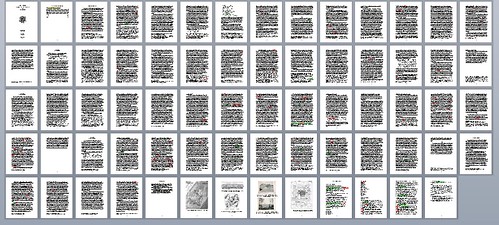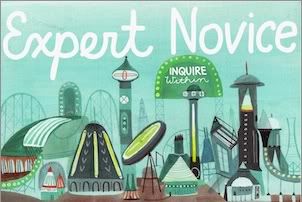
thesis, originally uploaded by Diana Kimball.
A month ago today, I turned in my senior thesis. On Atlanta's 1895 Cotton States and International Exposition; it was a work of love and distress. Through fall, I could feel the endeavor looming and beckoning, all the while knowing it should already have begun. Through January, I worried about the fact that I hadn't started writing yet. In February and March, I wrote everything. Since then, I've tried to swallow, and get distance.
The truth about a long writing project is that it's very different from a short writing project. A short writing project can be accomplished in a single night. And anything that can be accomplished in a single night falls into familiar patterns of delay and rush, completion and relief. Even if you have to stay up all night, the work somehow gets stuffed into circadian rhythms. You worry, write, and worriedly write, and then, in a quick succession of hours, it's over.
Writing has always been hard for me. Over years, I've found all these tricky ways to accomplish most of the work of academic writing without writing anything at all, to accommodate my relentless desire not to start the thing itself. Including: messy, elaborate schemes of serrated strips of paper full of quotes not mine piled on desks and scotch-taped together, color-coded, trains of thought captured in space (not words). Every paper in college, without fail, I've written this way. A huge gulp, a night of fear and compromises and elation and ideas, and a paper by morning.
My thesis could not go like this. But it really, really took me five months to work through to something else.
Patterns
Sinking in: to write about 1895, I read. For hours, days, hours. I did the same thing I always do, so I found newspapers and strange fragments. I transcribed them relentlessly. This is the café I went to every week, all fall and winter, to spend the best pale hours mindlessly copying. I imagined that once I mindlessly copied all of the newspaper articles at hand (there were always more articles), I would reduce each to a quote, then reduce the quotes to a smaller pile of quotes, and then there it would be, my thesis—waiting for fabric words. I am not surprised that I expected this, because it's the way I've always written. Compression and rearrangement, until in my organization of other people's words something substantial emerges. My own words last.
This did not scale. I had a feeling it might not, but kept going anyway, until I eventually found a different sort of compromise. But something important came from all those nervous months. I developed a relationship of mutual dependence with all of the characters, places, moments I was reading about. They needed me to save them from the past; I needed them to save me from starting. Led on by the desire to delay accountability for my own words, I lived through theirs for much longer than was necessary. But that endless research—the intricately, uselessly detailed picture that emerged—wasn't a waste. Glimpsing it was every private joy.
Patterns aren't for nothing. It takes a long time to know anything well enough to have something new to say. Even if those months of persistent research were caught up with avoidance, I know that if I'd started writing earlier, I would have been working from a very different picture. A much emptier one: so I'm grateful that it was full.
Surprises
At the same time, my hard drive was failing. (And then failed, during finals!) And anyway, there was no way I could compress the evidence, rearrange the fragments, and somehow manage to use the resulting words as a map.
What was hard for me was trusting my imagination. I wanted to save thinking and decisions for the end, and wanted to feel like whatever I discovered was a compact representation of the story in all its dimensions. But that story would never have been mine. In winter, in the basement at night, I tried to write an outline. And realized: I needed to change my thesis completely.
The project as I'd come to know it felt heavy. The idea of focusing on a part instead of the whole felt lighter. Instead of writing successive, winding chapters about the South, the nation, and the world, it occurred to me that I could write about the world alone. I knew the least about the world and the exposition, so: I'd have to research more.
But I found all of this evidence on the periphery of my vision, where I didn't expect it to be. I wrote a new outline from scratch, and watched the fragments in my mind rearrange themselves, levitating through thick air like something in a cartoon. It was all in my head, it was already all in my head.
The point of those months of research, I think, wasn't to write the whole story. It was to know enough of the whole story that I could walk through history confidently, curiously, and decide what might come next.
Systems
Holding together an unwieldy project, in all its charming and frustrating fits and starts, I became deeply attached to my systems.
Convincing yourself to do something you want to do but are afraid to do can require an inordinate amount of ritual. Anyone who's ever tried to do anything knows this. Reluctant, hopeful runners depend on the right shorts, right weather, right music. Novelists with coffee and a familiar glance out the window. Times of day, shoes on indoors, familiar rewards.
Some of the systems were hard-won and practical, and others should have been optional—but, of course, weren't.
Practical: the World of Writing. The World of Writing used to go like this. I'd have to start a paper, due the next day. I couldn't possibly start it. So I'd set a timer, start for fifteen or twenty minutes, and then immediately fall into an hour or two of sleep. Waking up, I'd be living in a world where all that existed was finishing what I'd started.
I thought this tactic might work on my thesis. But, then again, I didn't have classes on Wednesdays this semester. Very aware that I needed to actually start writing, I tried to work all night one Tuesday. But after the requisite pre-sleep writing segment, I realized I could sleep all night! And just pretend that nine in the morning was midnight. Internal conspiracy: so that's exactly what I did.
The next Tuesdays, ritualized: slight writing, rewarded by immediate sleep (more than usual), and a morning without browsers and only full of writing. By afternoon, ten or twelve pages. So that's how I wrote my thesis, in a month and a half of Wednesdays.
Impractical: pumpkin sunflower seed chocolate chip muffins from down the street, stepping off curbs in sneakers.
Very practical: Papers. I don't know what I would have done without Papers, the PDF library for OS X. Since almost all of the newspaper articles I needed came to me as PDFs (courtesy my school's subscription to ProQuest Historical Newspapers), I decided early on in my research to consolidate digitally. Papers has this wonderful full-screen reading mode, with a translucent black Notes overlay, and so I could sit and transcribe articles for hours. There are other ways I could have accomplished the same thing. But this way was fun, and beautiful. I've never enjoyed reading history on screens, but Papers let me love it.
Once everything was transcribed, Papers acted as a database of everything I'd already found interesting enough to download. Whatever threads my imagination picked up—"I remember the red jackets of programme boys," or "let's follow all the journalists"—I could search through all of my transcriptions and the results would show me my notes alongside the original article. The program was intuitive from the very beginning, but over months of working with it, I think it became fully interoperable with my imagination. It was an amazing tool.
Impractical: using my dorm room bed as a desk. Not only did this go against the advice of every sleep expert ever—do not use your bed for anything* but sleeping!—it also should have been conducive to accidental sleep. I couldn't care, and became very attached to writing surrounded by pillows. However, at some point I might want to transition back into the World of Desks. Okay. But not yet.
Impractical/practical: Spaces. Since all of my information started digital, I couldn't do what I always do—print out, cut up, tape together pieces, hang the results, gaze at the expanse and type away. Even in my mind, though, I treat information as though it hangs in viscous space. In order to represent that on my laptop, I turned to Spaces.
Spaces, in OS X, let you maintain up to sixteen different "desktops," and zoom in and out from them, pinning documents to positions on a meta-grid. I liked this: every cell of the grid (every desktop) could have an emergent theme. I could move fragments of information from space to space according to intuition, and then look at what had naturally accumulated and grouped together. This was a good idea.
The fragments were the problem. In order to turn information into modular units that could be dragged across dimensions, I dumped text into a series of over 200 unsaved text files. (See: Untitled 200, an exercise in precariousness.) I could pull these tiny windows from one space to the next. But, I didn't want to face saving them. This was a bad idea. I couldn't ever turn off my laptop, because I had no good way of capturing the spatial organization I'd put so much time into. It was a wildly irresponsible way to deal with my own work, but, miraculously, it sort of turned out all right. I may or may not have learned my lesson.
Practical: A degree of trust. Last summer, I wrote about the importance of trusted systems that let you trust yourself. All of these systems, practical and impractical, were part of that. As long as I was writing, I tried to trust that I would keep writing. Once I'd spent a few Wednesday mornings that way, I fell into a sort of love.
Spaces
Long writing projects are very different from short writing projects. Because you can't help but live with them: the space between starting and finishing holds so many idle moments. For a time, the work is never over, and that knowledge is hard to live with too.
In the middle of the night, in the middle of a paper and the old world of writing, I would sometimes take showers. Under running water, there was no way I could write anything down, so worry would lift, and I could just think. When I'd step out, I'd always know what to write next.
For some reason, when I was trying not to start my thesis for all those long months, I imagined that once I'd started, I'd have no choice but to keep going. All-nighters, save showers, are like that. What I somehow didn't realize: in reality, writing for six weeks straight would be absurd. Extraordinary, desperate effort is unsustainable. Long projects have to fit into the way your life really is.
But once I finally started, I always had somewhere to start. So every moment not spent writing felt like standing under running water. And, one morning, it was over.



3 comments:
Diana,
Excellent bit. And thank you; I needed this perspective for my own work.
Tell me you write for the Crimson.
One of your best. I feel you with the loopy writing, planning, arranging, make-my-eyes-go-fuzzy-to-see-things-differently process. As someone with over 160GB of pdf files, I'll have to try Papers. There's a fun authoring tool called Scrivener that I use quite a bit, you may find it intriguing -- virtual 3x5 cards.
Post a Comment